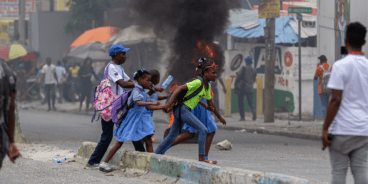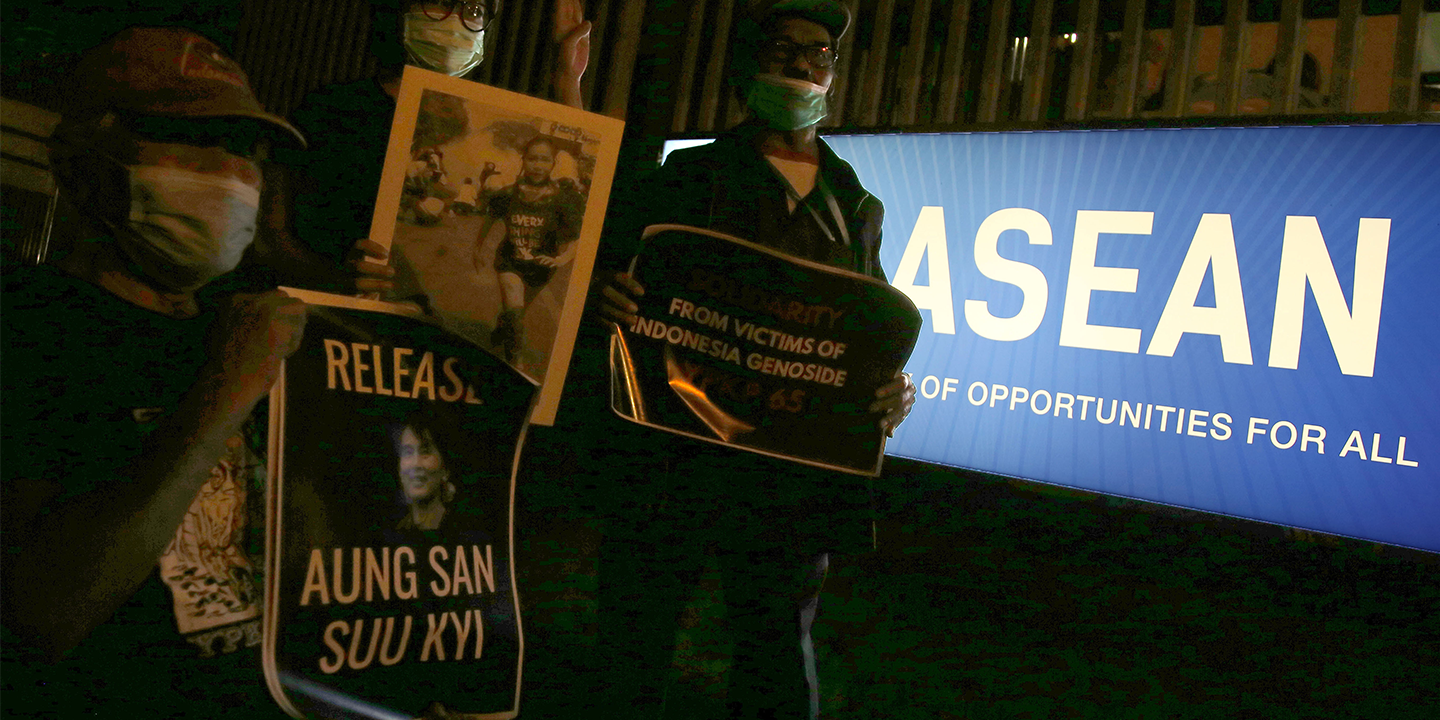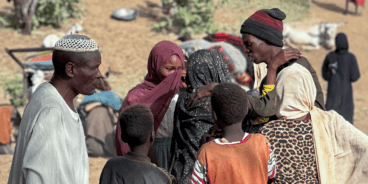

Atrocity Alert No. 249: Myanmar (Burma), DR Congo and Nigeria
Atrocity Alert is a weekly publication by the Global Centre for the Responsibility to Protect highlighting situations where populations are at risk of, or are enduring, mass atrocity crimes.
ASEAN must uphold its responsibility to protect the people of Myanmar
As anti-coup protests continue, during a 19 April interview the UN Special Rapporteur on human rights in Myanmar, Tom Andrews, said that, “according to the responsibility to protect [R2P], the international community… has a responsibility to do what it can to protect the lives of innocent people in countries that are unable or unwilling to do so, or are in fact attacking them.” He stressed that it was “definitely appropriate” for the international community to act in accordance with the R2P principle and that Myanmar was “exactly the situation” where we “have a responsibility to protect.”
According to the Assistance Association for Political Prisoners, 739 people have been killed by the security forces since 1 February and at least 3,331 people are currently detained for resisting the military coup. Two protesters were killed in the city of Mogok on 17 April, when the security forces opened fire on people gathered to show support for the National Unity Government (NUG), which was formed a day earlier by a coalition of democratic opponents to military rule.
Clashes also continue between Myanmar’s military and the ethnic armed group, the Kachin Independence Army. The military is reportedly using civilians as human shields in northern Kachin State, forcing them to walk ahead of soldiers. Such acts violate international law and are a war crime.
Meanwhile, the Association of Southeast Asian Nations (ASEAN) will discuss the ongoing crisis in Myanmar during a summit to be held in Jakarta, Indonesia, on 24 April. Controversially, Senior-General Min Aung Hlaing, the coup leader, was invited to the summit, while NUG representatives were not. It is unclear whether General Min Aung Hlaing – who an earlier UN Fact-Finding Mission found was responsible for the 2017 genocide against the country’s Rohingya minority – will attend the summit virtually or in person.
In an address to the UN Security Council (UNSC) on 19 April, former UN Secretary-General Ban Ki-moon stressed, “the principle of non-interference in the internal affairs of sovereign States should not be used as a pretext for inaction in the face of serious human rights abuses. ASEAN must make it clear to the Myanmar military that the current situation is so grave that it cannot be regarded only as an internal matter.” He further called on the current UN Secretary-General, António Guterres, “to engage directly with the Myanmar military” and urged the UNSC to “seriously consider” the principle of R2P, “using a range of tools at the Council’s disposal.”
The UNSC and ASEAN must implement practical measures to help mediate an end to the crisis in Myanmar. Nadira Kourt, Program Manager at the Global Centre for the Responsibility to Protect, said, “the country is currently ungovernable under the military junta. The UNSC and ASEAN should immediately impose a global arms embargo, as well as internationally binding sanctions on senior military officials and affiliated businesses. Accountability is essential. The time for so-called quiet diplomacy has passed. Now is the time for bold diplomatic action.”
Ethnic violence, displacement and hunger threaten DR Congo
Last Friday, 16 April, the UN Refugee Agency (UNHCR) warned of a resurgence of violence in the Grand Kasaï region of the Democratic Republic of the Congo (DRC). According to UNHCR, clashes between fighters from the Luba and Kuba ethnic groups in the Bakwakenge locality erupted in late March. Local authorities have reported that at least 21,000 people have been displaced, 13 people killed and 190 homes burned down. Tensions between the two communities have been increasing since August 2020 when a deadly cycle of reprisal attacks resulted in 40,000 people being displaced.
The risk of widespread ethnic violence is particularly acute in the Kasaïs, as the region continues to recover from atrocities perpetrated between 2016-2018 that forced more than 1.4 million people to flee. During that time the UN identified at least 80 mass graves, and more than 3,000 people were estimated to have been killed, including two members of the UN Panel of Experts who were investigating the violence. Most fighting took place between Kamuina Nsapu (a mainly Luba militia), Bana Mura (a mainly Chokwe militia), and the armed forces of the DRC. A UN Team of International Experts found evidence of war crimes and crimes against humanity perpetrated by the militias, including extrajudicial killings, rape, torture, and recruitment of children, as well as abuses that “could amount to persecution based on ethnicity.”
UNHCR spokesperson, Babar Baloch, called for “a renewed focus on restoring peace and defusing tensions in Kasaï to prevent another wave of mass displacement in the country.” There are currently an estimated 5.2 million people displaced in the DRC where recurring conflict in the eastern provinces has contributed to a massive humanitarian crisis. On 6 April the UN’s Food and Agriculture Organization and the World Food Programme announced that an estimated 27.3 million people – one in three Congolese – are critically hungry, which is “the highest number of people in urgent need of food security assistance in the world.”
The DRC government needs to urgently deescalate tensions in the Kasaï region, protect vulnerable civilians and ensure that the violence does not derail the ongoing truth, justice and accountability process for past atrocities.
Armed extremist groups target humanitarian workers in Nigeria
A series of attacks by armed extremist groups on the town of Damasak, in northeast Nigeria, have forced 65,000 people – 80 percent of the town’s population – to flee. Since the attacks began on 11 April at least eight people have been killed and dozens wounded. The armed groups looted and burned down houses, as well as offices and warehouses of international humanitarian organizations, including a health clinic and UN Refugee Agency facility. Armed fighters also conducted house-to-house searches looking for aid workers.
Humanitarian operations in Damasak have largely been suspended as result of the violence, adversely affecting 8,800 internally displaced people and 76,000 people in host communities in the area. Jens Laerke, spokesperson for the UN Office for the Coordination of Humanitarian Affairs, said that these “humanitarian aid operations and facilities are the lifeline of people in northeast Nigeria who depend on our assistance to survive.”
Over the past year, humanitarian organizations have become the focus of recurring attacks by armed extremist groups operating in Nigeria. On 2 March alleged fighters from the so-called Islamic State in West Africa (ISWA) attacked a UN base and overran a humanitarian hub in the north-east, trapping 25 aid workers. In response to this attack, the UN Resident and Humanitarian Coordinator in Nigeria, Edward Kallon, stressed that, “civilians and aid workers, their facilities and assets should never be a target. They must be protected and respected at all times.”
While no group has claimed responsibility for the assault on Damasak, both Boko Haram and ISWA continue to conduct attacks in the north-east and have killed at least 3,000 people since January 2018.
Intentionally directing attacks against personnel, installations, materials or vehicles involved in a humanitarian assistance operation is a war crime. Recurring attacks on humanitarian workers demonstrates the need for the Nigerian authorities to radically improve security in the north-east. The Nigerian government also needs to expand programs that directly address grievances that armed extremist groups exploit for recruitment, such as poverty, endemic corruption, youth unemployment and environmental degradation.
Related Content


Atrocity Alert No. 435: Sudan, Israel and the Occupied Palestinian Territory and Democratic Republic of the Congo
